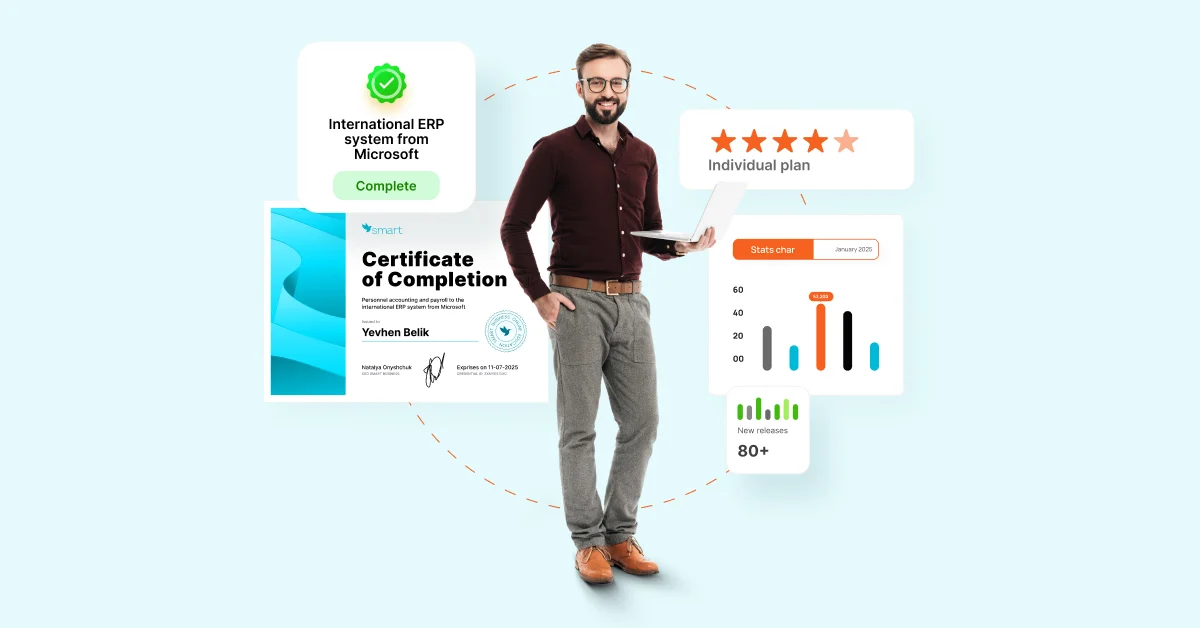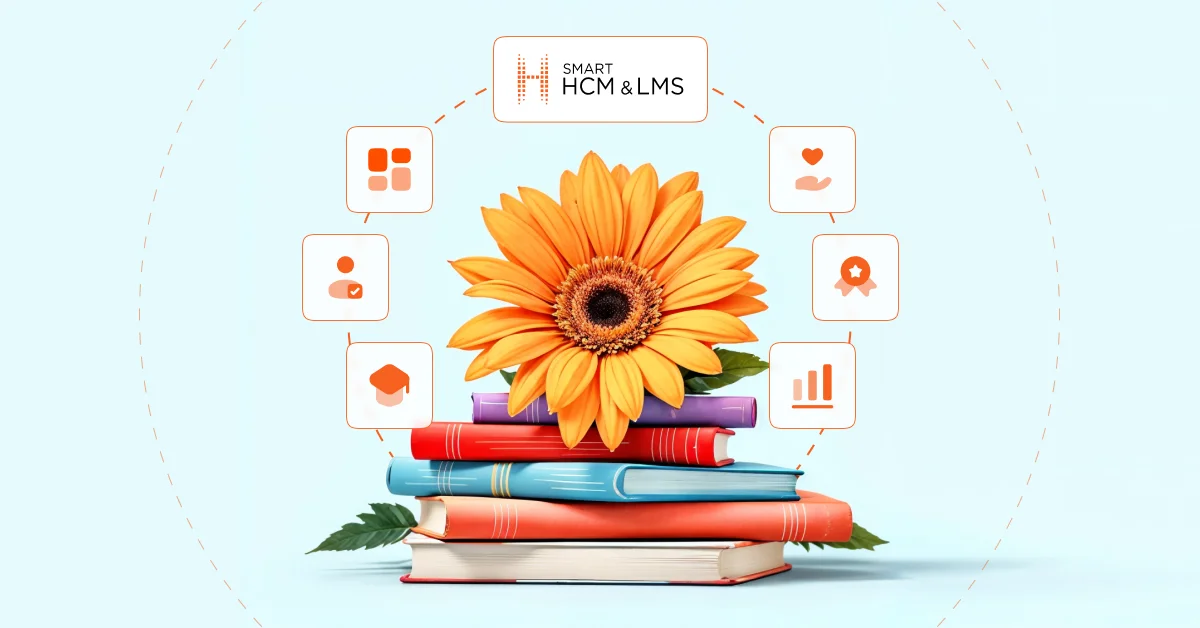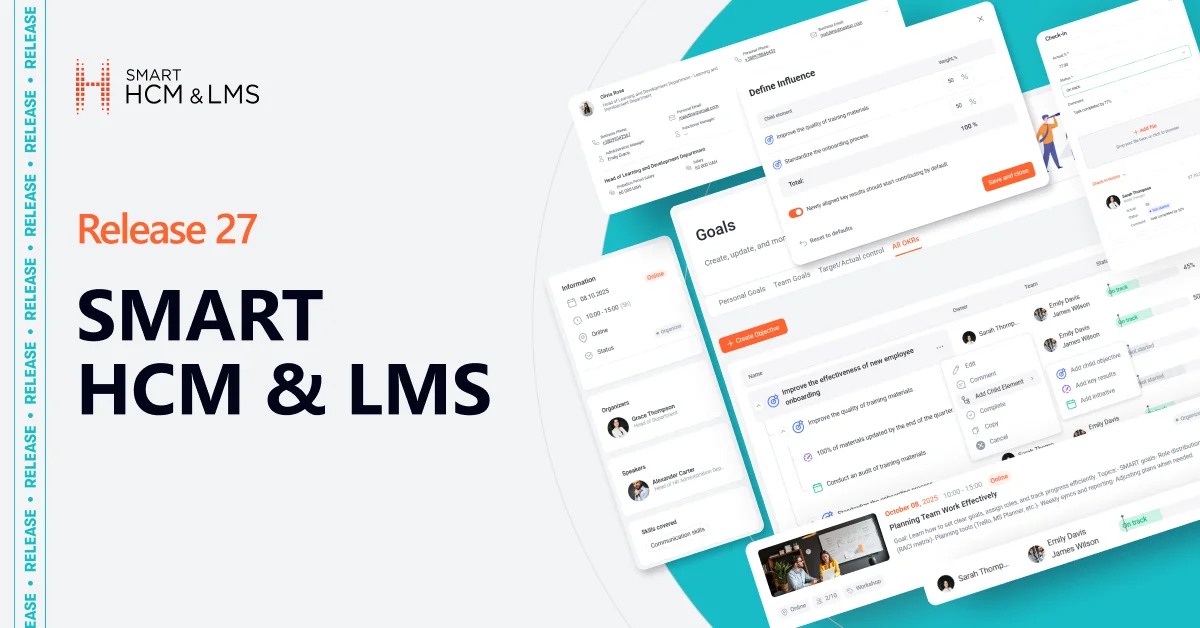LMS (Learning Management Systems) — digital learning management systems — have shown some of the fastest growth rates in global software demand since the early 2020s.
According to a 2022 study by the industry publication MarketsandMarkets, the global corporate LMS market was valued at $8.1 billion USD. The forecast predicts that between 2023 and 2027, this software market will grow at a compound annual growth rate (CAGR) of 21.1%.
This is not just a passing trend — it reflects a clear business advantage, as companies always focus on growth.
For example, the report Learning Management Systems Statistics, Facts and Trends for 2024 found that in companies using modern knowledge management solutions:
- Employee training efficiency increases by 93%,
- Training costs decrease by more than 40%,
- Employee retention rates increase by 92%.
At the same time, key business KPIs improve significantly:
- Profitability rises by nearly a quarter (24%).
- Revenue grows more than twofold (218%).
These figures show that investing in employee training through LMS implementation means capitalizing on a company’s most valuable resource — its people — and strategically strengthening the company’s competitive edge.
What Is an LMS System and How Does It Work
An LMS system is a digital learning management system that serves as a useful tool both for organizing e-Learning and for business as a whole. It allows you to create interactive training materials and manage learning online: track the progress of students and employees; assess their work and identify additional knowledge needs; manage projects and tasks.
Types of LMS and How to Choose the Right Platform for Employee Training
Let’s look at relevant solutions for business. The most common classification of Learning Management Systems is based on their deployment and hosting methods. In particular:
SaaS LMS (Software as a Service)
These SaaS LMS platforms are ready-made cloud solutions provided by vendors who handle hosting, technical maintenance, updates, and security. Advantages of these SaaS solutions include:
- Fast deployment
- No infrastructure costs
- Scalability
- Regular updates
Main disadvantages:
- Limited flexibility in customization
- Data is stored on the vendor’s side
Tip: Choosing this type of LMS makes sense for companies that want to implement a learning system quickly without significant infrastructure investments.
Cloud-Based LMS
Like SaaS, cloud-based LMSs are cloud solutions. However, their main difference is that cloud-based solutions offer greater control over the environment since they are hosted on cloud infrastructure (for example, Azure) that can be managed by either the vendor or the client company.
Advantages of Cloud-Based LMSs:
- Flexibility in customization
- 24/7 access from any device
- Ability to choose a cloud provider
A downside can be dependency on the internet. However, given the current stage of technological development, the risk of losing internet access is practically zero.
According to data published by Global Growth Insights, in 2024, over 70% of LMS implementations worldwide were cloud-based.
Interesting fact: Experts predict that the number of users favoring these solutions will grow rapidly. According to the report Learning Management Systems Statistics, Facts and Trends for 2024, in 2024, 30% of all learning hours took place online, and by 2032, this figure will reach 85%.
Tip: Cloud-Based Learning Management Systems are suitable for companies that need flexible solutions capable of adapting to changing business needs and rapid scaling. This makes them a relevant choice for retail chains with many branches.
On-Premises LMS
These LMS systems are installed on a company’s own servers. In this case, full control over the system, data, and security remains with the client.
Clear advantages of On-Premises LMSs for users include:
- Maximum control over data and security
- Ability to fully customize the system
As for disadvantages:
- High costs during the launch and maintenance stages
- Need for an IT team to support the system
Tip: On-Premises LMS systems are suitable for companies with high data security requirements or for those governed by specific regulatory restrictions in their operations.
Custom LMS
Also called custom-built solutions. These are usually created from scratch or heavily modified to meet the specific needs of a business, making them completely unique solutions. The main advantages of Custom LMSs are:
- Full alignment with the company’s business processes
- Unique interface and functionality
Among the obvious disadvantages:
- High development costs
- Long implementation time
- Need for a development team and, mostly, dependence on their ongoing support
Tip: Custom LMS development is appropriate for companies with unique training processes or specific integration requirements.
Features and Capabilities of a Cloud LMS Using SMART HCM & LMS as an Example
SMART HCM & LMS is a comprehensive solution based on Microsoft technologies for building a modern HR ecosystem and effectively managing human capital.
The E-Learning module in this solution provides a wide range of tools for managing employee training and development.
Specifically, it allows you to:
- Plan training according to the company’s strategic goals,
- Create your own knowledge center and enable employees to grow dynamically within the company,
- Implement the concept of accessible learning and continuous employee development 24/7.
Which Businesses Benefit from the SMART business LMS Platform
The learning management system SMART HCM & LMS — an in-house development by SMART business, a leading Microsoft partner — is a universal centralized platform for managing, delivering, and tracking educational content and training programs.
Thanks to its extensive functionality, it easily adapts to the needs of various industries and has already proven itself as an indispensable tool in today’s business environment. This is confirmed by successful implementation cases.
Let’s look at some of the most common scenarios for its use.
LMS system for Corporate Business
For corporate businesses, a learning management system is primarily a strategic tool for developing personnel as the company’s key asset, helping to increase productivity and achieve business goals. Therefore, the main requirements for such a solution are:
- Focus on specific business results: the LMS should enable measuring the impact of training on key metrics. For example, a training course for the sales team should “convert” into improved performance indicators.
- Integration with HCM/HRM: for large companies, automating employee training processes is important. The LMS should support individual career growth plans and upskilling and reskilling
- Scalability and flexibility: corporate LMS must serve hundreds or even thousands of users located in different locations and organizational units.
- Continuous learning: it’s important that learning is not a one-time event, but an ongoing process integrated into the corporate culture.
- Motivation through gamification, rankings, badges: as tools to boost employee engagement.
- Analytics based on Power BI: provides deep analysis and data-driven decision making.
SMART HCM & LMS meets all these requirements and enables building learning strategies aligned with company goals.
LMS for Healthcare Institutions
The specific requirements for LMS systems in healthcare institutions stem from the need for medical staff to continuously update their knowledge according to the latest research, keep track of changes in treatment protocols, and periodically renew qualifications for licenses, permits, and compliance with medical standards.
Therefore, an LMS for medical institutions must provide:
- Continuous professional education: support for the full certification cycle, including automated reminders about the need to update knowledge; monitoring the validity of current certificates; and maintaining a history of completed courses and training.
- Knowledge control and documentation: the ability to conduct tests with report generation; keeping training logs in the prescribed format; creating electronic certificates for use during inspections, accreditations, or audits.
- Case methods: support for interactive learning formats combined with theoretical material.
- Modularity and microlearning: since medical staff have tight schedules, the LMS system should allow training in short modules with mobile access to courses anytime.
- High data protection standards: considering the handling of sensitive information (patient data), compliance with international standards (such as GDPR in Europe) is essential.
Tip: Choose an LMS that allows for quick creation of training courses based on updated clinical guidelines, automatic certificate renewal, and report generation for regulatory and accreditation bodies.
Important: According to the World Health Organization, up to 80% of medical errors are linked to human factors and lack of up-to-date knowledge. This means most of these errors can be prevented by investing in systematic training of medical personnel.
LMS for Retail
When choosing an LMS system for retail businesses, it’s important to consider that it should become an effective tool for quickly adapting staff, standardizing service, and continuously improving team performance — at all levels, from sales associates to regional managers.
Training in retail should be simple, fast, mobile, and directly linked to sales results. After all, the quality of staff training affects customer experience, average transaction value, and ultimately, the company’s turnover.
A quality LMS system for retail should provide:
- Fast onboarding training for new employees: to ensure quick adaptation of newcomers through a standardized procedure.
- Constant updates on product and service knowledge: allowing centralized updates on products, promotions, sales techniques, and service standards across the entire network.
- Rapid evaluation of training impact on work results: enabling comparison of performance with commercial metrics. For example, employees who completed the “upsell” module increased the average check by 7%.
- Mobility: the LMS platform should be accessible from smartphones and have an intuitive, mobile-friendly interface.
- Tools to boost motivation: in retail, a rewards system is extremely important. Therefore, an LMS for this sector should support corporate competitions tied to key KPIs, including badge systems, rankings, and gamification elements to increase engagement.
Important: According to the Deloitte Global Retail Trends 2024 study, 71% of retail companies in Europe plan to significantly increase investments in employee retention initiatives in the coming years, particularly through upskilling and reskilling programs.
LMS System for Non-Governmental Organizations (NGO)
For non-governmental organizations, an LMS is not just a platform for staff training but a key knowledge management tool to build internal capacity and ensure transparent reporting to donors.
Training in NGOs should be:
- Accessible, considering the technical and language specifics of target groups.
- Localized, according to the cultural and legal context of each country.
- Documented, to ensure control, auditing, and reporting to grant providers.
- Flexible, as it covers different participant categories — permanent staff, project program participants, volunteers — who may work in various countries and have different skill levels.
In terms of LMS features, this means:
- Easy access and high usability: availability of a mobile version and a simple, minimalist interface that allows users with different digital skills to navigate the platform easily.
- Role-based access and adaptive content: since the training platform may be used not only by organization members but also volunteers, partner organizations, and project participants, it is critical to flexibly manage content access based on role, language, region, or participation format.
- Automated reporting: NGOs usually need to prepare many reports for authorities, local governments, and donors. Therefore, having tools for automatic generation of reports on training completion, certification, user activity, and other key metrics is essential.
- Localization and customization: for organizations operating in multiple countries or regions, not only language localization but also the ability to consider cultural, legal, or social specifics is necessary. Bringing together people with diverse needs may require inclusive design efforts — for example, adaptations for users with visual, hearing, or cognitive impairments.
Thanks to low-code technology, SMART business’s LMS solution allows adapting system interfaces to the individual needs of the company, expanding the standard list of features.
Tip: If you plan to participate in international projects, when choosing an LMS, pay attention to its compliance with international data protection requirements (especially GDPR).
What Business Challenges Does the SMART HCM & LMS System Solve?
The purpose of SMART HCM & LMS is to be an integrated part of a company’s strategic IT infrastructure, covering the full cycle of personnel development, including:
- Onboarding new employees for quick adaptation from day one.
- Talent management — identifying potential and developing key competencies.
- Continuous learning — creating a culture of development and upskilling within the company.
- Analytics and reporting — measuring specific metrics that show the impact of training on business results.
Possible Integrations with the SMART HCM & LMS Learning Management System
The solution easily integrates with key business systems, creating a unified digital ecosystem for personnel and learning management.
This not only automates and optimizes training processes but also ensures prompt synchronization and data updates across different departments and systems. Supported integrations include:
- HR systems — for automatic updating of employee information, positions, and organizational changes.
- Performance evaluation modules — enabling planning and launching training based on employee performance assessments.
- Corporate communication tools (Microsoft Teams, Outlook, SharePoint) — allowing training to be organized within a convenient environment.
- Analytics tools (Power BI, Excel Online) — providing the ability to export custom reports, including dashboards for management.

Why Choose SMART HCM & LMS
Implementing SMART HCM & LMS is an investment in the development and capitalization of a company’s most valuable asset — its people.
The solution provides a comprehensive transformation of training processes — from a fragmented approach to systematic knowledge management. It enables a company to create its own knowledge center and implement the concept of continuous employee development, aligned with business strategy, corporate culture, and market dynamics.
Benefits of Implementing an LMS for Business
The solution helps take human capital management to a new level of efficiency, reduces operational training costs, and ensures the scalability of HR processes according to business growth rates. Specifically, it offers:
- Standardization of knowledge: a unified training approach ensures consistent quality standards in service, communication, and management at all company levels.
- Increased employee productivity: the ability to implement training scenarios focused on developing practical skills that directly affect employee effectiveness.
- Scalability of training: the system easily adapts to business expansion — new offices, remote teams, branches in different countries — while maintaining stable training quality.
- Transforming training processes into real business results: training is linked to key performance indicators (KPIs), allowing tracking of its actual impact on achieving business goals.
Why Businesses Choose SMART HCM & LMS
SMART HCM & LMS is a comprehensive solution for effective human capital management, built on Microsoft technologies. It provides not only process automation but also strategic support for employee development. Key advantages include:
- A unified platform for HR and training: all processes — from recruiting to employee development and retention — are combined into a single system.
- High level of security: personal data protection complies with international standards (GDPR in Europe).
- Automation of most processes: the LMS system automatically assigns courses based on roles and evaluation results, sends deadline reminders, and generates certificates.
- Flexible learning builder: supports various formats (video, text, SCORM courses, webinars) and allows creating individual learning paths by role and specialization.
- Mobility and accessibility: full mobile version and 24/7 access from any device.
- Motivation through gamification: the ability to add more excitement to learning using a corporate store and gamification.
- Powerful HR analytics and real-time reporting based on Power BI: suitable for internal audits as well as reporting to investors or donors.
- Quality support thanks to the ability to automatically save feedback history in the employee’s profile.
- Flexible localization and customization via low-code technology: the LMS system easily adapts to local office requirements, including branding, language, and internal process specifics.
An Example of How LMS Solution Helps Azerbaijan’s Unibank Strengthen Human Capital
Our clients — from companies worldwide — by implementing SMART business’s Learning Management System, provide their employees with tools for continuous development, quick adaptation to changes, and growth of professional expertise.
For businesses, this is a significant competitive advantage in a dynamic market.
Read the case study on how SMART HCM & LMS helped one of Azerbaijan’s largest private banks significantly reduce training costs and time.
How Corporate Learning Will Change: Key LMS Development Trends in 2025
The key trends in the development of Learning Management Systems (LMS) for business in 2025 and the near future are:
Personalized Learning Through AI Technologies
The integration of artificial intelligence (AI) into LMS opens a new level of efficiency for corporate training. Thanks to the use of AI in HR processes, it is possible to create adaptive learning paths that take into account:
- The employee’s current knowledge level,
- Their individual learning style and pace,
- Results of previous courses,
- Development goals according to their role in the company.
This personalized approach significantly increases employee engagement and the quality of material retention, making learning truly relevant and useful.
Interesting fact: According to research by Global Growth Insights, companies that integrated AI into their LMS achieved:
- Up to 62% increase in employee engagement — thanks to precise course recommendations,
- Up to 55% improvement in knowledge retention — thanks to adaptive modules,
- A 50% increase in overall training program effectiveness compared to traditional approaches.
Learning in the Flow of Work
Learning in the flow of work is one of the leading trends in corporate training that matches the dynamics of modern business processes.
This approach means learning happens without interrupting the main work, through integration into daily work tools — such as Microsoft Teams, Outlook, and corporate portals.
This allows employees to:
- Receive relevant knowledge exactly when they need it,
- Maintain productivity by avoiding “logging out” of their work environment,
- Engage in a culture of continuous microlearning within the company.
Interesting fact: Brent Skinner, a well-known HCM strategist, expressed in one of his podcasts that learning has ceased to be a separate process and smoothly transitioned into all areas of our activity.
Microlearning and Mobility
This trend aligns with the Learning in the Flow of Work approach, but the focus here is on short, targeted content accessible from mobile devices.
Microlearning is a format where knowledge is delivered in small blocks (3–7 minutes), allowing employees to:
- Learn at convenient times and places — while on the go, between meetings, or during short breaks,
- Quickly address specific knowledge needs,
- Better retain information thanks to concise presentation,
- Reduce cognitive load.
Thus, microlearning and mobility ensure maximum adaptability of the learning process to the pace of modern business.
Integration of Social Learning
Modern LMS increasingly include social learning features that allow employees to learn not only individually but also through interaction with colleagues. These can be:
- Forums and topic discussions,
- Integrated chats and course comments,
- Collaborative learning projects,
- “Ask an expert” or mentoring functions.
This approach boosts motivation and employee engagement since learning becomes not only an obligation but also part of active team communication.
According to Global Growth Insights research, social learning features, including collaboration tools, are present in 44% of new LMS developments.
Gamification of Learning
Despite the current popularity of this trend, experts predict its further development, especially with the addition of virtual and augmented reality technologies.
Analytics and Data Management
Modern LMS are actively evolving, expanding the capabilities of built-in analytical tools that allow HR professionals to:
- Track learning progress,
- Evaluate program effectiveness,
- Make informed decisions about employee development.
Analytics in LMS provides deeper insight into what works best, which learning formats deliver the greatest results, and which knowledge areas critically need updating.
Thus, integration, AI-based technologies, personalization, mobility, and analytics are already radically changing learning approaches today — making it more flexible, effective, and results-oriented.
Want to learn more about digital learning and how to ensure continuous development of your company’s staff? Register for a free consultation here.



